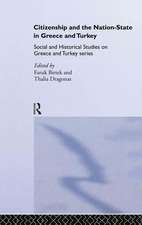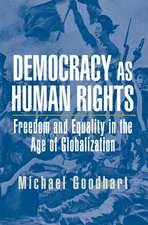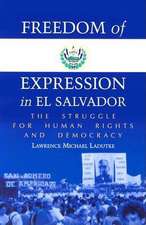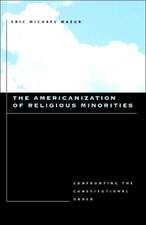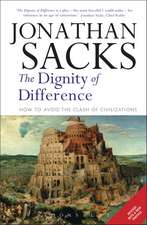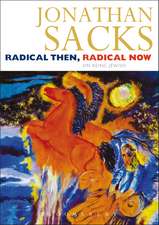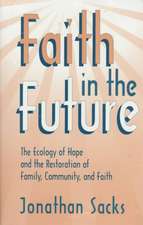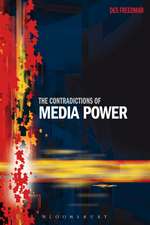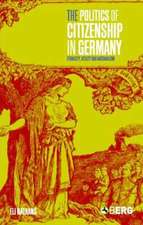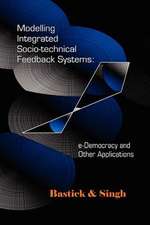The Home We Build Together: Recreating Society
Autor Sir Jonathan Sacksen Limba Engleză Paperback – apr 2009
Arguing that global communications have fragmented national cultures and that multiculturalism, intended to reduce social frictions, is today reinforcing them, Sacks argues for a new approach to national identity. We cannot stay with current policies that are producing a society of conflicting ghettoes and non-intersecting lives, turning religious bodies into pressure groups rather than society-building forces.
Britain, he argues, will have to construct a national narrative as a basis for identity, reinvigorate the concept of the common good, and identify shared interests among currently conflicting groups. It must restore a culture of civility, protect "neutral spaces" from politicization, and find ways of moving beyond an adversarial culture in which the loudest voice wins. He argues for a responsibility- rather than rights-based model of citizenship that connects the ideas of giving and belonging.
Offering a new paradigm to replace previous models of assimilation on the one hand, multiculturalism on the other, he argues that we should see society as "the home we build together", bringing the distinctive gifts of different groups to the common good. Sacks warns of the hazards free and open societies face in the twenty-first century, and offers an unusual religious defence of liberal democracy and the nation state.
Preț: 77.21 lei
Preț vechi: 124.90 lei
-38% Nou
14.78€ • 15.37$ • 12.20£
Carte disponibilă
Livrare economică 22 martie-05 aprilie
Livrare express 08-14 martie pentru 71.67 lei
Specificații
ISBN-10: 0826423493
Pagini: 288
Dimensiuni: 138 x 216 x 23 mm
Greutate: 0.34 kg
Editura: Bloomsbury Publishing
Colecția Bloomsbury Continuum
Locul publicării:London, United Kingdom
Caracteristici
Notă biografică
Cuprins
1. Introduction
2. Society as Country House, Hotel or Home
3. A Brief History of Multiculturalism
4. The Defeat of Freedom in the Name of Freedom
5. Victims
6. Technology and the Fragmentation of Culture
7. The Inward Turn
Part Two: A Theory of Society Creation
8. A Forgotten Political Classic
9. Social Contract, Social Covenant
10. Telling the Story
11. The Responsible Society
12. The Home We Build Together
Part Three: Where Next?
13. The Uses of Covenant
14. Who Am I?
15. Face-to-Face, Side-by-Side
16. Civility
17. Multiculturalism or Tolerance?
18. Mending the Broken Family
19. A Religious Defence of Liberal Democracy
20. A Time to Build
Notes
Suggestions for Further Reading
Index
Recenzii
We, the majority, could want no more eloquent and intelligent advocate than Jonathan Sacks to 'speak for England', or indeed for Britain
Identity in a post-multicultural society will have a new foundation, if Sacks has his way.
' found Mr Sack's detailed examination of social contracts and civil society, which he suggests is best grounded in covenantal commitments, most interesting... I was encouraged by Mr Sack's vision.
British Chief Rabbi Sir Jonathan Sacks is the premier public intellectual of Judaism in the English-speaking world and has no obvious counterpart in the communities of Judaism conducted in other languages. No one in Israeli intellectual life competes ...This book joins with its predecessors...to form an oeuvre of moral authority and compelling logic. For a corpus of writing substantially less ambitious than this some have received the Nobel Prize.
There is much of great wisdom here, for readers of all faiths and none.
Sacks confronts issues many would prefer to ignore and presents responses which will make some people uncomfortable. Nevertheless these are issues we have to address if we want to enjoy social cohesion.
This important book...addresses a crucial theme
A deeply philosophical, yet extremely hard-hitting book.
[Sacks] argues like an expert dancer, leading his audience through a waltz of lilting reasonableness.
Descriere
"Multiculturalism has run its course, and it is time to move on." So begins Jonathan Sacks' new book on the future of British society and the dangers facing liberal democracy.
Arguing that global communications have fragmented national cultures and that multiculturalism, intended to reduce social frictions, is today reinforcing them, Sacks argues for a new approach to national identity. We cannot stay with current policies that are producing a society of conflicting ghettoes and non-intersecting lives, turning religious bodies into pressure groups rather than society-building forces.
Britain, he argues, will have to construct a national narrative as a basis for identity, reinvigorate the concept of the common good, and identify shared interests among currently conflicting groups. It must restore a culture of civility, protect "neutral spaces" from politicization, and find ways of moving beyond an adversarial culture in which the loudest voice wins. He argues for a responsibility- rather than rights-based model of citizenship that connects the ideas of giving and belonging.
Offering a new paradigm to replace previous models of assimilation on the one hand, multiculturalism on the other, he argues that we should see society as "the home we build together", bringing the distinctive gifts of different groups to the common good. Sacks warns of the hazards free and open societies face in the twenty-first century, and offers an unusual religious defence of liberal democracy and the nation state.

